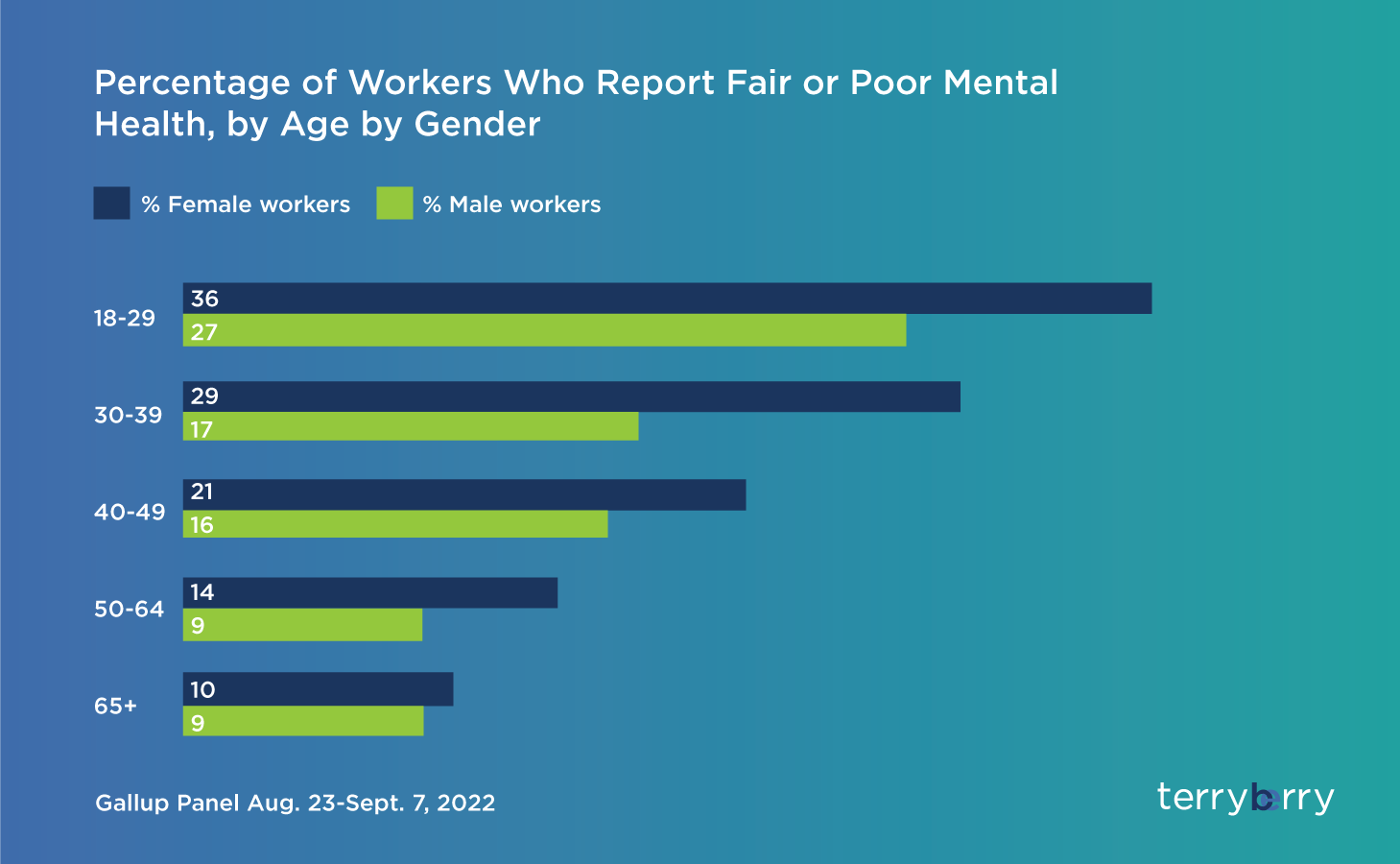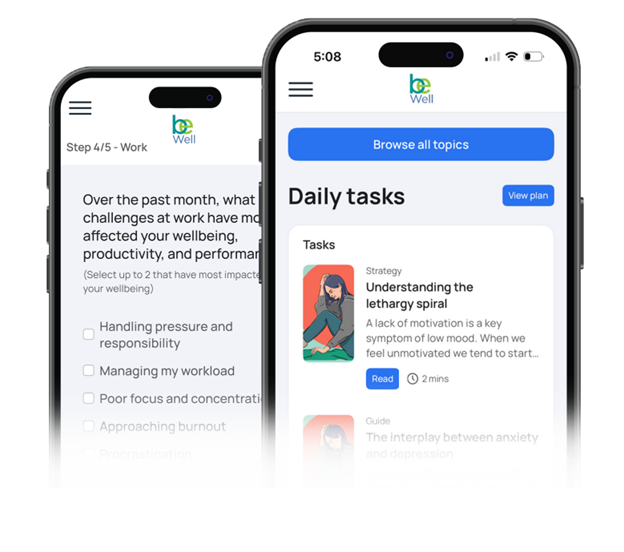April 9, 2025

May is Mental Health Awareness Month. Learn how you can emphasize your commitment to your employees' mental health not just this month, but the entire year.
May is Mental Health Awareness Month. Learn how you can emphasize your commitment to your employees' mental health not just this month, but the entire year.
What is Mental Health Awareness Month?
Since its creation in 1949, Mental Health Awareness Month has been observed each May. The goal is to raise awareness of the importance of mental health, destigmatize mental illness, and advocate for policies that support individuals and families impacted by mental health challenges.
Why should companies aim to improve mental health?
Any business with a strong company culture values the overall well-being of its employees and wants to put in the effort to ensure they feel valued and cared for.
We also can't overlook the fact that poor mental health has an economic cost. In our country alone, unplanned absence due to poor mental health has an annual cost of $47.6 billion in lost productivity.
When employees feel their workplace has had a negative effect on their mental health, they are more likely to be disengaged and less likely to recommend their company as a good place to work.
RELATED: 7 Habits of Highly Disengaged Employees

Activities and programs to support employee mental health
A whopping 92% of workers feel that it's important to work for a company that values their psychological and emotional well-being.
Mental Health Awareness Month is the perfect time to raise awareness about the resources and services that are available to your employees and promote understanding of the realities of mental illness.
Here are a few initiatives you can implement to support the mental health of your employees.
RELATED: Diversity Culture: How to Bring Psychological Safety to the Workplace
Corporate Wellness Apps
As of 2023, 90% of Americans had a smartphone. So if you really want to reach your employees where they are, an app can be a great option.
From metal health resources to physical activity challenges, Terryberry's Be Well app has everything you need in one place to ensure your employees' mental wellness is taken care of.
Be Well offers personalized well-being plans that support both physical and mental wellbeing. Whether it’s stress, anxiety, or a struggle with focus, participants get to tailor their plans specifically to their challenge areas
Plus, we deliver expert-led online training to help improve and sustain the mental well-being of you and your team, and we back it up with our support team to help with even the toughest challenges. Support employees’ mental well-being by accessing our library of 150+ expert audio guides across 40+ mental health topics.
Educational Speakers
Education can go a long way in reducing the stigma surrounding mental health in the workplace and equipping employees with recommendations to manage stress and common mental health struggles.
A stress management workshop can cover the impact of stress on your mental and physical health along with effective recommendations to manage stressors in life. Topics could include mindfulness practices, time management skills, coping during a crisis, and how to set healthy boundaries.
Mental health resource fair
During mental health awareness month, consider scheduling a resource fair so employees can gain access to information and resources related to mental health and wellness. Connect with agencies and health care professionals who will spend an afternoon telling employees about what services or tools they provide.
Here's what you might expect to find at a resource fair:
Informational booths:
Almost a third of employees don't know how to access their company's EAP. During a resource fair, HR members can set up a table and explain how to access your EAP or other resources employees may be interested in using.
Take it a step further by asking local professionals to set up informational booths or tables. They can spread awareness about substance use recovery services, community resources, and confidential support options employees can access if they're going through a hard season in life.
For individuals who prefer to receive support without their colleagues knowing, send an email or memo about how to access crisis resources as needed.
Mental health screenings:
Ask mental health care professionals to visit and offer screenings for some mental health conditions such as depression, anxiety, PTSD, substance use, eating disorders, or ADHD.
For maximum efficacy, screenings should be paired with information about treatments that employees may be able to access and a list of mental health care professionals who are equipped to work with each kind of mental illness.
Community support groups:
Community support groups are a valuable resource for individuals who may not be comfortable with having a conversation regarding their mental health within the workplace. Employees are often unaware that they have access to these groups within their communities.
Talk to local mental health care providers who can point you in the direction of support groups within your community, whether they're a chapter of a larger organization (such as SMART Recovery or AA) or a localized club (such as grief groups or anxiety support groups).
Wellness challenges
Research has shown a strong connection between physical and mental health, so step challenges are one way to encourage better mental health. However, there are also many challenges you can schedule to focus directly on mental health.
Some mental health wellness challenge ideas include:
Mindfulness challenge
Research has proven that mindfulness meditation can help relieve symptoms of anxiety, depression, stress, PTSD, and substance use disorder. So, lead a challenge that teaches employees how to practice mindfulness in their daily life.
For example, you may suggest ways to practice mindful eating or remind participants to unplug and meditate for 10 minutes a day.
Stress reduction challenge
77% of employees have experienced work-related stress within the last month, accompanied by negative impacts such as emotional exhaustion, irritability with their colleagues, and decreased productivity.
During the challenge, you can offer information about stress management techniques, suggest and encourage strategies that reduce common workplace stressors, and work on developing peer support groups.
Sleep hygiene challenge
Nighttime binge-watching, doom scrolling, and caffeine consumption are just a few practices that discourage good sleep and increase a person's chance of developing a mental illness or a substance use disorder.
A sleep hygiene challenge emphasizes the importance of getting enough sleep. Once employees have an understanding of the connection between quality sleep and good mental health, you can add tasks that foster better sleep, like eliminating screen time an hour before bed.
The Sleep Foundation has designed a 14-day sleep challenge with tips and advice to help employees get enough sleep so they wake up feeling truly rested. This is a great stepping point for designing your own challenge that covers four main topics: a healthy sleep routine, the optimal sleep environment, the tie between physical and mental wellness, and alcohol and caffeine.
To boost participation, consider opening up your challenges so that families can also participate. Engagement often skyrockets when loved ones are involved. Plus, employees are more likely to stay committed when their entire family is making a lifestyle change.
Digital detox challenge
The constant connection provided by social media and email can take a toll on mental health and contribute to conditions such as anxiety and depression. Design a digital detox challenge to encourage intentional, healthy technology use habits.
Regis University outlines a 30-day challenge plan that encompasses awareness about your current habits, strategies to establish boundaries, designing a digital diet, and implementing mindful tech use.
Self-care bingo
Self-care bingo is a fun strategy to raise awareness about the benefits of self-care and what the practice truly looks like. To many people, the phrase self-care conveys thoughts of bubble baths and long weekends away.
In reality, self-care means intentionally taking care of your mental and physical health instead of putting them on the back burner.
To tailor this approach to your workplace, talk to employees about what activities they are most interested in and have the bandwidth for. The result should be a bingo card that includes activities such as:
- playing board games with loved ones
- going on a 30-minute walk every day for a week
- spending time in nature
- having a conversation with their doctor about concerning mental health symptoms
- writing in a gratitude journal each night before bed
- reading for pleasure
- cooking a quality meal to enjoy with your family
Mentorship and peer support groups
Community is an essential aspect of good mental health. Mentorships and support groups help strengthen these relationships within the workplace.
Workplace mentorships don't have to be solely professional relationships. They're also an opportunity to form a supportive relationship where the mentor can help the mentee develop healthy habits to better manage work-related stressors.
A support group is typically comprised of individuals who share a similar background and can benefit from the experience and camaraderie of others who can relate. Groups may talk about the mental health struggles they experience or share ways they cope with symptoms of mental illness.
Look at your mental health policies
Encouraging good mental health in your employees requires an authentic, long-term commitment. Unfortunately, a few activities throughout the month of May aren't going to be enough to truly support workers with mental illness, reduce the stigma that accompanies most conversations regarding mental health, and limit work-related risk factors that contribute to stress, anxiety, and depression.
The American Psychological Association highlights the reality of mental health support in the workplace with some disheartening statistics.
- Only 43% of businesses offer health insurance that provides coverage for mental illnesses and substance use disorders.
- 35% of employees feel like their company culture encourages taking breaks.
- 29% of employers offer an employee assistance program.
The majority of businesses in the US haven't established policies that promote the mental health of their employees. Are you one of them or are you in the minority who do?
Choosing to support your employees' mental health isn't just good for the overall company culture -- it's also good for business.
While an average of 33% of people are looking for a new job each year, that number rises to 57% of people who don't feel like their company prioritizes their well-being by offering the appropriate mental health resources and support. High turnover becomes costly as you lose employee morale and productivity and invest time and money in filling vacant roles.
Additional resources for Mental Health Awareness Month
Many mental health organizations and agencies have developed resources to help you spread the word about Mental Health Awareness Month. They all include social media content, and may also offer resources such as educational content, alt text for your images, general mental health resources, and even Giphys to use on social media.
Toolkit from the Substance Abuse and Mental Health Services Administration
SAMHSA has designed an extensive social media toolkit that includes shareables for each week. The key message changes from week to week and encompasses the following themes.
- Week 1: Spreading acceptance and support for friends and family struggling with their mental health.
- Week 2: Engaging in tactics to encourage good mental health.
- Week 3: Encouraging acceptance and awareness surrounding mental illness.
- Week 4: Seeking support and treatment for mental health struggles.
- Week 5: Focusing on hope and positivity regarding mental health.
Additional resources in the toolkit include virtual backgrounds, resources for content development, and suggestions about how to engage in respectful conversations regarding mental health.
SAMHSA's national helpline provides free and confidential support to anyone looking for treatment referrals and information regarding mental illness and addiction.
Toolkit from the National Alliance on Mental Illness
NAMI has designed a full set of social media graphics that cover affirmations, fast facts, and details about the mental health problems the organization offers.
Toolkit from the National Institute of Mental Health
The NIMH offers a toolkit with digital shareables to post on social media platforms, including X, Facebook, LinkedIn, and Instagram. It includes images, captions, and alt text for 4 posts, as well as links to additional resources and videos.
Toolkit from Mental Health America
MHA's Mental Health Awareness Month toolkit has social media content, templates, printable handouts, and DIY tools to utilize throughout the month. They have also created a guide for businesses and employers with suggestions on how to focus on mental health.
Don't stop at Mental Health Awareness Month
For successful companies, choosing to prioritize employee mental health doesn't end on June 1st -- it's an intentional commitment to the entire wellbeing of their people all year long.
Get started with Terryberry to start building a corporate wellness program today.





